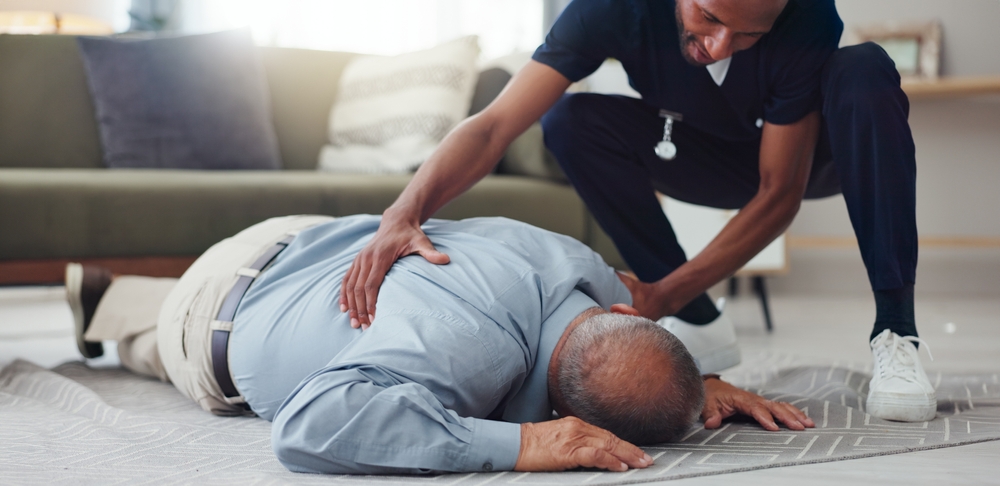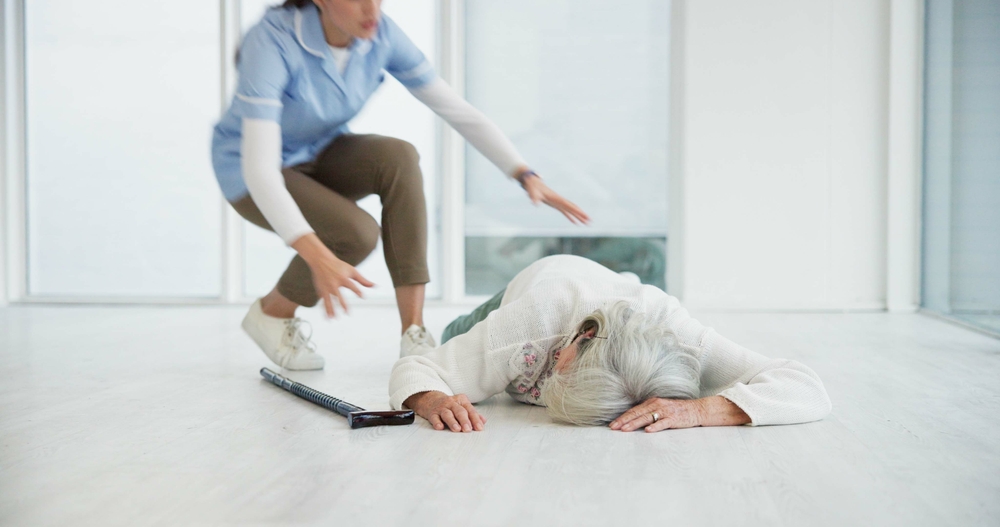Common Excuses Nursing Homes Use To Avoid Liability For Falls
Nursing Home AbuseIn the unfortunate event that a loved one falls while living in a nursing home, it is natural to want answers and justice. If you or your loved one has suffered a fall in this environment, compensation might be achievable if you can prove liability. Reach out to an experienced nursing home injury lawyer in your area who can guide you through the process and seek compensation for your injuries.
Nursing homes often attempt to avoid culpability for falls by using various excuses to avoid paying settlements and protect their reputations. Victims must be aware of these common strategies and understand nursing home residents’ rights, especially if they suffer life-changing injuries. They must also have the right representation from a nursing home injury attorney to counter any tactics by nursing homes.
Here are some of the most common excuses used by nursing homes in the event of an injury claim.
Blaming the Resident for Their Own Fall

One common excuse nursing homes often use to avoid liability for falls is to blame the resident for their own fall. They may argue that the resident was not careful or did not follow instructions, leading to their fall. However, it is essential to remember that nursing homes have a duty of care to ensure the safety and well-being of their residents. They must provide proper supervision, assistance, and support to prevent falls. Blaming the resident shifts the responsibility away from the nursing home and disregards their duty to protect their residents.
Denying Negligence on Behalf of the Staff
Another common excuse nursing homes use is denying any negligence on their staff’s behalf. They may argue that the staff followed all the necessary protocols and did not contribute to the resident’s fall. However, it is important to question whether the nursing home had proper staffing levels, trained staff, and safety measures in place to prevent falls. Negligence can arise from a lack of training, inadequate supervision, and failure to address known risks. Denying negligence without thorough investigation is a tactic often used to avoid liability.
Asserting that Falls Are an Inherent Risk of Aging
Some nursing homes may argue that falls are an inherent risk of aging and cannot be entirely prevented. While it is true that older adults are more susceptible to falls due to factors such as decreased mobility, balance issues, and vision problems, it does not absolve nursing homes of their responsibility to mitigate these risks. Nursing homes must assess and address each resident’s specific risk factors and implement appropriate measures to prevent falls. This may include providing mobility aids, ensuring a safe environment, and implementing fall prevention programs. Asserting that falls are inevitable disregards the duty of nursing homes to provide a safe and secure environment for their residents.
How a Nursing Home Injury Attorney Can Prove Liability for a Fall

Falls in nursing homes can have devastating consequences, often resulting in serious injuries or even death. When nursing homes try to avoid liability, a nursing home injury attorney can play a critical role in proving liability and seeking justice for the victim and their family.
A nursing home injury attorney’s first step is to thoroughly investigate the circumstances surrounding the fall. They will gather evidence such as medical records, incident reports, witness statements, and any available surveillance footage. This evidence can establish the cause of the fall and uncover any negligence by the nursing home staff or facility.
Next, the attorney will evaluate the nursing home’s responsibility to provide a safe environment for its residents. They will examine whether the nursing home had taken reasonable measures to prevent falls, such as implementing proper safety protocols, providing assistive devices, and adequately supervising residents. If the attorney finds any lapses in these areas, it can strengthen the case for proving liability.
In addition to evaluating the nursing home’s responsibility, the attorney will also assess the role of individual caregivers in the fall incident. They will investigate whether the staff members involved in the resident’s care followed the appropriate protocols and provided the necessary level of supervision and assistance. If it is found that the staff members neglected their duty of care, it can contribute to proving liability.
Proving liability in nursing home falls may also require the expertise of medical professionals. A nursing home injury attorney will consult with medical experts who can evaluate the resident’s medical history and the severity of their injuries and determine if the fall was a result of any underlying medical conditions or medication errors. These expert opinions can strengthen the case and provide a clear link between the fall and the negligence of the nursing home.
Another important aspect that a nursing home injury attorney will consider is the documentation of the resident’s fall risk assessments and care plans. They will review these documents to ensure that the nursing home had conducted proper assessments to identify the resident’s risk factors for falls and had developed a comprehensive care plan to address these risks. If the nursing home failed to conduct adequate assessments or implement appropriate care plans, it can be instrumental in proving liability.
Once the attorney has gathered all the necessary evidence, they will use it to build a strong case against the nursing home and pursue a claim for compensation on behalf of the injured resident. This may involve negotiating with the nursing home’s insurance company or taking the case to court if a fair settlement cannot be reached. The attorney will advocate for their client’s rights and work tirelessly to ensure justice is served.
Falls in nursing homes can have devastating consequences, and holding the responsible parties accountable is crucial. If your loved one has been a victim of a nursing home fall, seeking the help of a knowledgeable and experienced nursing home injury attorney can make a significant difference in the pursuit of compensation.
Insurance Companies Also Try to Limit Liability for Nursing Home Injury Claims
Insurance companies are also known for employing various tactics to limit their liability. One of the most common strategies is offering lowball settlements to victims and their families. They may try to convince you that their initial offer is fair and reasonable, but in reality, it is often far from adequate. These lowball offers are designed to tempt vulnerable individuals into accepting less than what they truly deserve.
Another tactic that insurance companies may use is telling you that there is no need for a lawyer. They may try to convince you that you can handle the claim on your own and that hiring an attorney will only complicate things. However, it is essential to understand that insurance companies have lawyers working on their behalf. They are well-versed in the legal system and will do everything possible to protect their bottom line. By hiring an attorney for a nursing home injury claim, you level the playing field and protect your loved one.
Insurance companies may also challenge the cause or severity of the injuries sustained in a nursing home fall. They may argue that the injuries were pre-existing or unrelated to the fall. This tactic is aimed at undermining your claim and downplaying the impact of the incident. A skilled nursing home injury attorney can gather evidence of the injuries, consult medical experts, and build a strong case to counter these challenges.
Allow your nursing home injury lawyer to handle every aspect of the insurance process to avoid any errors that might reduce your compensation. Insurance adjusters can be tricky, so leave this process to a legal professional.
How Nursing Home Negligence Causes Falls

While accidents do happen, and while nursing homes assert that most falls are accidents, nursing home negligence can certainly contribute to these incidents. By recognizing the common causes of falls in nursing homes, you can better understand why you should seek the help of a nursing home injury lawyer if your loved one has been injured.
Understaffing
One of the main reasons falls occur in nursing homes is understaffing. When staff members are not available to properly assist residents with their daily activities, such as getting in and out of bed or using the restroom, the risk of falls increases significantly. Inadequate staffing levels can also result in delayed response times during emergencies, leaving residents vulnerable to accidents. An attorney can help hold the nursing home accountable for their negligence and fight for compensation for any injuries sustained due to understaffing.
Environmental hazards
Another common cause of falls in nursing homes is environmental hazards. Slippery floors, poor lighting, and cluttered hallways can create dangerous conditions for residents. These hazards can be the result of neglectful maintenance or the failure to implement proper safety protocols. A skilled attorney can investigate the nursing home’s negligence in maintaining a safe environment and seek justice for any injuries caused by these avoidable hazards.
Medical errors
Medical errors and medication mismanagement are also significant contributors to falls in nursing homes. When residents are not properly monitored, or their medications are not administered correctly, their physical and cognitive abilities can be compromised, increasing their risk of falling. An attorney with experience in nursing home negligence can gather evidence to prove the facility’s negligence in providing adequate care and pursue compensation for any injuries resulting from medical errors or medication mismanagement.
Common Nursing Home Fall Injuries
Nursing home falls can result in various injuries, ranging from minor bruises to more severe outcomes. The extent of the injury will depend on factors such as the age and overall health of the resident, as well as the circumstances of the fall.
Here are some frequent injuries resulting from a nursing home fall.
- Bone fractures.
- Head injuries and traumatic brain injuries (TBIs).
- Sprains and strains.
- Spinal injuries.
- Soft tissue injuries.
What’s more, one can never underestimate the emotional turmoil suffered during a nursing home fall. It is the reason damages are so important to a victim. Losing one’s independence for any time in later life is a terrifying prospect. A fall victim is justified in seeking payment for all of their suffering.
You Can Win Damages For Nursing Home Falls
When it comes to nursing home falls, victims and their families have the right to seek compensation for the damages they have suffered. The legal concept of tort law allows individuals to hold negligent parties accountable for their actions. Here are the different types of damages that may be available in a nursing home fall case.
Economic Damages
Economic damages refer to the financial losses incurred as a result of the nursing home fall. These can include medical expenses, rehabilitation costs, and any loss of income or earning capacity. Economic damages are quantifiable and aim to compensate the victim for their financial losses.
Non-Economic Damages
Non-economic damages compensate for the physical and emotional pain and suffering endured by the victim as a result of the nursing home fall. These damages aim to provide compensation for intangible losses that cannot be easily quantified, such as loss of enjoyment of life or mental anguish.
Punitive Damages
In some cases, punitive damages may be available in nursing home fall cases. These damages are meant to punish the nursing home for their egregious conduct and deter similar behavior in the future. Punitive damages typically apply in cases where there is evidence of willful or reckless disregard for the residents’ safety.
Nursing home fall cases can be complicated, requiring thorough investigation, gathering of evidence, and legal knowledge. By working with an experienced attorney, you can maximize your chances of receiving the compensation you deserve.
Fall Victims Reach Out to a Nursing Home Injury Lawyer Today
Do not let any fears about the cost of legal representation deter you from seeking help. Most attorneys who handle nursing home fall cases work on a contingency fee basis, meaning they only get paid if they win your case.
Additionally, consultations with nursing home injury attorneys are typically free of charge, allowing you to discuss your case and explore your options without any financial obligations.
Contact an experienced attorney in your area today to discuss your loved one’s nursing home fall case. You and your elderly loved ones deserve to be protected with all your rights upheld, so do not hesitate to book a free consultation with a lawyer today.

Nathan Hughey, an attorney and fourth-generation South Carolinian, founded Hughey Law Firm in 2007. Before that, he spent five years defending nursing homes and insurance companies. Leveraging his experience, he now advocates for those injured or wronged by such entities, securing over $290 million in verdicts and settlements.